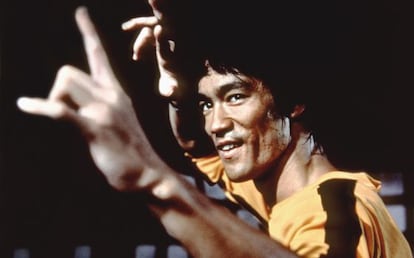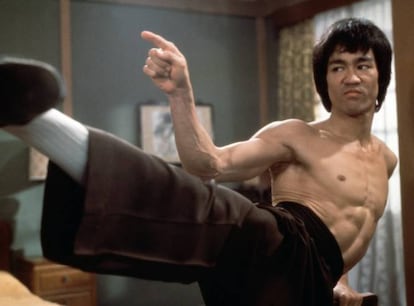Bruce Lee may have died from drinking too much water
EL PAÍS talks to one of the researchers of a new study that argues that the martial arts star may have succumbed to hyponatremia


When Bruce Lee died in Hong Kong on July 20, 1973, at just 32 years old, he was already a martial arts legend and movie star. His premature death furthered enshrined his legendary status, especially since the cause of death was never clarified. The autopsy found the actor had suffered a cerebral edema, but did not explain why, sparking many conspiracy theories. Some even suggested Lee was a victim of the triad, the Chinese mafia. But now, a new study published in the December 2022 issue of the Clinical Kidney Journal has offered a new explanation: hyponatremia, or the kidney’s inability to excrete excess water.
The study, carried out by researchers at Madrid’s Fundación Jiménez Díaz, states: “Hyponatraemia is frequent, as is found in up to 40% of hospitalized persons and may cause death due to excessive water ingestion even in young healthy persons [...] The fact that we are 60% water does not protect us from the potentially lethal consequences of drinking water at a faster rate than our kidneys can excrete excess water. Ironically, Lee popularized the quote ‘Be water my friend,’ but excess water appears to have ultimately killed him.”
María Vanessa Pérez Gómez, an associate specialist of the Nephrology Service and one of the authors of the study, tells EL PAÍS by phone: “We did not expect [the research] to have such an impact, although we did want people to understand the importance of kidneys to health.”
According to Pérez Gómez, the study is not based on new information, but is rather an analysis drawn from publicly available material. This includes the fact that Lee was 5 foot 6 inches tall (1.71 meters), had only 1% body fat (the World Health Organization recommends 10-20%) and lost 22 pounds while filming Enter the Dragon due to stress, with his weight falling to 132 pounds. In addition to this information, the researchers found other considerations that suggested he could have died from water intoxication, says Pérez Gómez.
On the day of his death, Bruce Lee was working on Game of Death, which would be released five years after his passing. He visited the leading actress, Betty Ting Pei, at her home in Hong Kong. Late in the afternoon, Lee suffered from a terrible headache, and Ting Pei gave him a pain reliever, Equagesic. His brain swelled by 1%, going from 49 to 56 ounces. The actor was pronounced dead at 10.15pm. Three quarters of an hour later, the actor’s producer and partner, Raymond Chow, released a statement, in which he lied about the circumstances of Lee’s death. Fearing rumors, he said that the star had died at his home with his wife, Linda C. Emery, who corroborated this version. In the autopsy, no reference was made to the cannabis found in his body, although years later the doctors admitted the discovery.

According to Pérez Gómez, hyponatremia can happen after a person drinks an excessive amount of water in one go. But that’s not the only way. In Lee’s case, she believes he had a number of risk factors that made it difficult for his kidneys to eliminate water. “For example, the actor drank a lot of water, his diet was based mainly on liquids, such as carrot juice, he ate little and consumed a lot of marijuana, which causes great thirst, as well as opioids for his pain, and diuretics such as Furosemide,” she explains.
“Excessive exercise, as was in his case, can cause increased production of the antidiuretic hormone, making it difficult for you to eliminate water. A few weeks before [he died], he had suffered another cerebral edema accompanied by acute renal failure. At that time, his urea [a toxic organic substance that is expelled through urine and sweat] was 92 mg/dl.” A figure above 40 is already alarming, 100 is deadly. “If on that day, he also drank a lot of water, we have hyponatremia.”
How much water did Lee drink? “We will never know, and it is not important for the result,” says the researcher. “Every person is different. It is good to drink liquids, but I insist: every human being is different, every diet – if you eat a lot of fruit, which contain a lot of liquid – has a diverse range of effects, and of course, we would have to calculate how many solutes you ingest: I am referring especially to salt.”
Gómez Pérez hopes the study will serve as a public health reminder. She explains: “What we want is for people to understand the importance of healthy diets, risk factors and kidney care. The kidneys not only cleanse, they also produce an anti-aging hormone, a hormone that prevents anemia and vitamin D, which is essential for bone health.”
Tu suscripción se está usando en otro dispositivo
¿Quieres añadir otro usuario a tu suscripción?
Si continúas leyendo en este dispositivo, no se podrá leer en el otro.
FlechaTu suscripción se está usando en otro dispositivo y solo puedes acceder a EL PAÍS desde un dispositivo a la vez.
Si quieres compartir tu cuenta, cambia tu suscripción a la modalidad Premium, así podrás añadir otro usuario. Cada uno accederá con su propia cuenta de email, lo que os permitirá personalizar vuestra experiencia en EL PAÍS.
¿Tienes una suscripción de empresa? Accede aquí para contratar más cuentas.
En el caso de no saber quién está usando tu cuenta, te recomendamos cambiar tu contraseña aquí.
Si decides continuar compartiendo tu cuenta, este mensaje se mostrará en tu dispositivo y en el de la otra persona que está usando tu cuenta de forma indefinida, afectando a tu experiencia de lectura. Puedes consultar aquí los términos y condiciones de la suscripción digital.








































